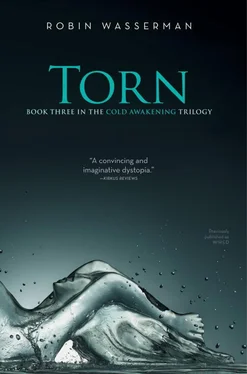“Yeah, I’m sure it’s a nonstop party,” Ani said. Jude shot her a look. Riling up the crowd would be fine—mandatory, even—once we got inside. But first we had to get in. Which meant playing nice.
“I don’t care what it is,” the dimpled girl said, “as long as it’s safe.”
The mech next to her, who’d spent most of the ride with her head lowered, long blond hair covering her face, suddenly looked up. “Did you know anyone who… ?”
“Couple friends. You?”
“Yeah,” the girl said, and dropped her head again. “I knew someone.”
She didn’t say anything else. I wondered if she was regretting that she’d boarded the truck at all, instead of following in the footsteps of her someone , uploading with him, virus or not. Her confession got everyone else going, and soon the truck was buzzing with questions and details, the whos, whats, hows, where-were-you-whens of natural disaster.
“I said, what about you ?” the guy next to me repeated, poking me like I hadn’t heard him the first two times.
Before I could answer, Jude’s hand was at his throat. “Don’t touch her.”
The guy looked alarmingly unintimidated. He grabbed Jude’s wrist and jerked it away, then began to rise unsteadily to his feet, lurching toward us.
“Please stop,” I said, though part of me wanted to push Jude away and knock this guy out myself.
You’re not invincible anymore, I reminded myself. None of us was.
“It’s fine,” I said, louder. “Please.”
“You should teach your boyfriend how to keep his mouth shut,” the lurcher grunted, but at least he sat down.
“I don’t need you protecting me,” Jude hissed.
“And I don’t need to watch you get the crap kicked out of you again.”
He opened his mouth, then shut it again, and I knew we were both thinking about the last time he’d gotten the crap kicked out of him.
I didn’t understand how Riley could be everywhere and nowhere at once.
It was quiet after that, for one hour, then two, the twelve of us scrabbling for purchase as the truck lurched over bumps and veered around corners. There was a long, straight coasting that seemed to go on forever, then a string of mini-quakes as the tires ground over a gravel road. The truck jerked to a stop, flinging me into Jude’s lap. We were there.
Safe Haven was a corp-town. It made sense. Parnassus and BioMax were sister corps, subsidiaries of the same bureaucratic overlords, which meant the Parnassus residence facility would be up for grabs. I hadn’t been back to a corp-town since the Synapsis attack, and I would have been happy enough to keep it that way.
Not that the two had anything in common. Where Synapsis had been all fake greenery and reflecting ponds, the Parnassus corp-town made no attempt to disguise its primary purpose, which was the mining and making of things that it could transform into piles of credit. The people who lived there were, presumably, secondary. So there were no playing fields, no botanical gardens, no gleaming glass residence cubes with pristine atriums at their hearts. Parnassus workers lived in steel, windowless domes.
There was nothing here to remind me of the Synapsis corp-town and the bloated bodies I’d stepped over in my escape. Nothing except the fact of the corp-town itself, and the claustrophobic feeling that descended as we stepped into steel dome number seven. Residence centers in every corp-town were designed along the same principles: maximum sleeping facilities, minimum means of escape. I’d seen how quickly the Synapsis steel shutters locked down the building at the first triggering of an alarm; this dome was nothing but one huge steel shutter. It locked behind us.
It was obvious we wouldn’t to be mingling with the orgs. Those had been cleared out. Way out, judging from the barbed-wire fence we’d passed on our way in. So it was just us. The communal space, an atrium of bare silver paths and sloping steel archways, was mostly empty. A few mechs in identical orange sweats wandered through the metallic park, looking like they had nowhere in particular to go but around and around on the circular walking track. The mechs we’d arrived with seemed equally purposeless, standing around, waiting to be told what to do. So we blended, waiting patiently by the entry checkpoint, neither asking questions of the orgs guarding the gate nor speculating among ourselves what might lie beyond it.
I pulled out my ViM, planning to pretend to check my zone while I snapped a few surreptitious pics for the network. But I couldn’t link in.
“I wouldn’t bother with that,” a woman in a BioMax uniform informed me. “You can’t link in from here.”
There was a chorus of confused complaints, mine included. I was proving better than I would have expected at blending in. Turned out it was easy to be a sheep.
The org woman cleared her throat. “It’s for your own protection. As you know, it’s crucial that the location of this resettlement community be known to a limited population, and while none of you would intentionally compromise the safety of your fellow download recipients, we’ve decided the safest course of action is to jam the network, for the time being.”
“But what about our families?” Jude said, sounding laughably alarmed. “It’s bad enough having to leave them behind. You’re telling me I can’t even talk to them?”
I worried he’d gone too far over the top, but the woman looked suitably sympathetic. “We have, of course, made accommodations for communication with friends and family. Those communications will be monitored, and all sanctioned correspondence will go through. A small price to pay for your security and peace of mind, wouldn’t you say?”
Disgruntled murmurings, all amounting to: Sure. I guess.
I couldn’t believe they were accepting it. But then, they’d come here voluntarily, giving themselves up to BioMax’s protection. There were mechs here that we knew, that we’d spoken to, that we’d begged to choose us over the corp, showing them the evidence we’d gathered of what BioMax had done, what the corp had stolen from us, because we were nothing but machines, to be pared down for parts. The mechs who’d come here were the ones who didn’t care. Someone was trying to kill them; BioMax was trying to save them. It was simple as that.
At this point, trusting anyone was starting to seem impossibly stupid—and now I understood what Jude must have thought of me all those months, watching me on the vids, preaching trust and goodwill as I held hands with the enemy.
Once it had been made clear that the outside world—and its rules and freedoms—no longer existed for us, the intake process could begin in earnest.
They took our clothes.
They made us stand there together, twelve strangers, and strip ourselves bare while they watched. We tried to turn our backs to one another, tried to cover up with hands and crossed legs and awkward contortions, keeping our heads down, our eyes slitted, as the BioMax personnel circulated, searching us for “contraband,” for anything that might challenge the safety of the safe haven: knives or ViMs or dreamers or bombs. I closed my eyes as the woman’s meaty hands swept my body, and played the game I’d played too many times before, the familiar mantra: This is just the body; this is not me. She can’t touch me.
When her hands fell away and I opened my eyes again, I met Jude’s gaze. Alone in the group he stood tall, head up, eyes open. When he saw me watching, his lips moved, and I imagined I could understand the words they formed, a message to me:
For Riley.
They gave us clothes, freshly laundered, branded with the BioMax insignia. Beige and orange, nothing I would ever have voluntarily worn in public, but decisions like that were no longer voluntary. We’d been in BioMax’s possession for less than a day, and it was already starting to feel inevitable, the outside world real enough but irrelevant. Every detail of Safe Haven was designed to remind us that this was our life now. Temporary , they said, again and again, to the outside world. But in here they hadn’t said it once.
Читать дальше












